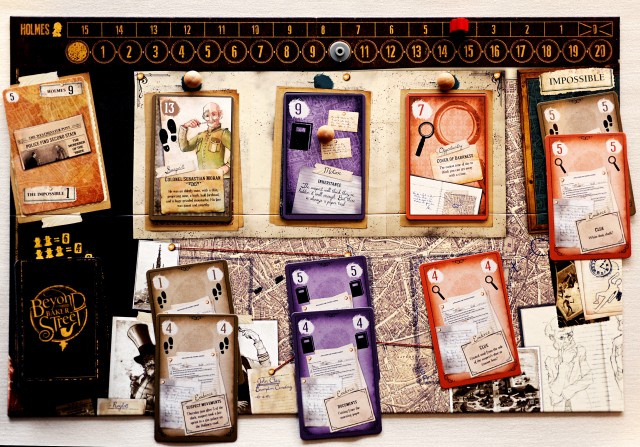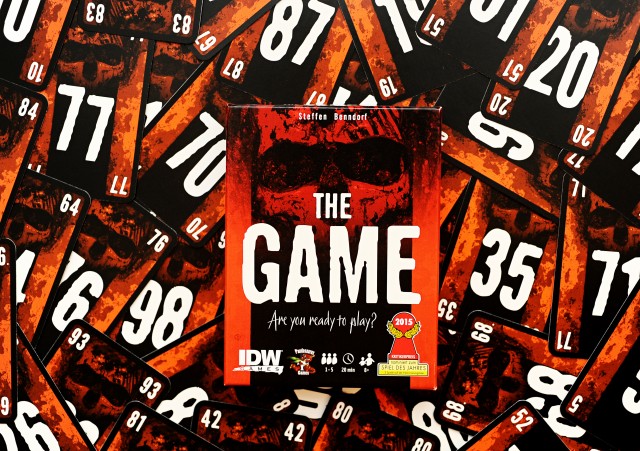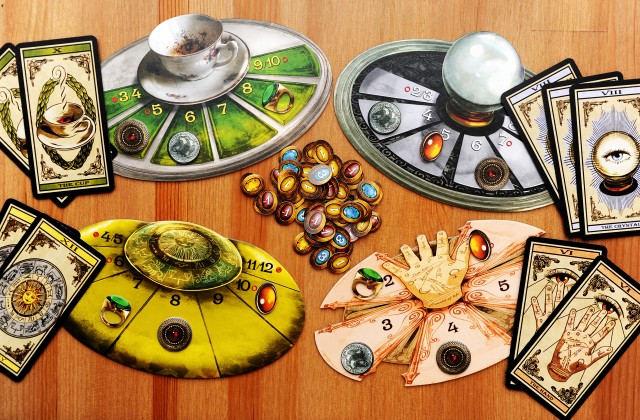Hanabi burst colourfully into the board game scene and into our hearts in 2010, and it is certainly counted as a favourite among the Daily Worker Placement crew (not to mention it won the Spiel des Jahres in 2013). It’s a complex cooperative deduction and memory game, where players can’t see their own cards and are relying on clues from fellow players to ensure they can lay down their fireworks cards to create the perfect show. While the gameplay is simple, the nuances of playing the game well are many. Clue giving is tough and the memory aspect is particularly challenging for me. So even though I still love playing Hanabi, I have started to fall back on some other similar games that scratch that kind of deduction and memory itch, but can be a little less punishing!
Beyond Baker Street – designed by Robin Lees and Steve MacKenzie, published by Z-Man. Plays 2 – 4 people in approximately 20 minutes.
 We previewed Beyond Baker Street a little while back if you’d like to get the full details of this little gem. While aspects of gameplay mirror Hanabi with players hands facing out, and giving clues to others about what’s in their hands, the game takes a little more of a thematic twist with the Sherlock Holmes setting. As well as playing cards to designated ‘leads’ to solve cases, you’ve got to try and beat Sherlock to it, and also eliminate other evidence to the “Impossible” to hit 20 exactly. These differences to Hanabi keep the game fresh and fun, as well as the character cards and abilities each player gets. There’s a nice amount of variety here and I bet you could draw in even novice investigators to this one!
We previewed Beyond Baker Street a little while back if you’d like to get the full details of this little gem. While aspects of gameplay mirror Hanabi with players hands facing out, and giving clues to others about what’s in their hands, the game takes a little more of a thematic twist with the Sherlock Holmes setting. As well as playing cards to designated ‘leads’ to solve cases, you’ve got to try and beat Sherlock to it, and also eliminate other evidence to the “Impossible” to hit 20 exactly. These differences to Hanabi keep the game fresh and fun, as well as the character cards and abilities each player gets. There’s a nice amount of variety here and I bet you could draw in even novice investigators to this one!
The Game – designed by Steffen Benndorf, published by IDW Games. Plays 1 – 5 players in approximately 20 minutes. Nominated for Spiel des Jahres in 2015.
 A card puzzle that’s so simple in its execution, but a wonderful challenge to play through solitaire or with a group. Every player can see their own hand of cards, and is cooperating with other players to play cards out sequentially to one of four piles. There are two ascending piles (from 1) and two descending piles (from 100), so there’s a little wiggle room to make sure everyone can play out what they need to – but what I like best are the “special” plays of being able to place a card 10 higher or lower than what’s currently on top of any of the discard piles. While there’s not a lot of table talk allowed in this one, much like Hanabi, you must still communicate with other players to make sure you can all try and get through the deck and have every card played out to win!
A card puzzle that’s so simple in its execution, but a wonderful challenge to play through solitaire or with a group. Every player can see their own hand of cards, and is cooperating with other players to play cards out sequentially to one of four piles. There are two ascending piles (from 1) and two descending piles (from 100), so there’s a little wiggle room to make sure everyone can play out what they need to – but what I like best are the “special” plays of being able to place a card 10 higher or lower than what’s currently on top of any of the discard piles. While there’s not a lot of table talk allowed in this one, much like Hanabi, you must still communicate with other players to make sure you can all try and get through the deck and have every card played out to win!
Abracada…what? – designed by Gun-Hee Kim, published by Z-Man Games. Plays 2 – 5 players in approximately 30 minutes.
 Possibly the most fun, light-hearted and family-oriented of the bunch – and also the only competitive one! This feels like a far less punishing version of Hanabi where you have “spell tiles” facing out, and you have to take a look around at what other players have and deduce what you may likely have in front of you and attempt to cast spells. If you cast correctly, you can push your luck and keep trying, or pass – the idea is to eliminate other players or cast all your spells successfully and win the round. Terrific fun, and really sweet art to boot.
Possibly the most fun, light-hearted and family-oriented of the bunch – and also the only competitive one! This feels like a far less punishing version of Hanabi where you have “spell tiles” facing out, and you have to take a look around at what other players have and deduce what you may likely have in front of you and attempt to cast spells. If you cast correctly, you can push your luck and keep trying, or pass – the idea is to eliminate other players or cast all your spells successfully and win the round. Terrific fun, and really sweet art to boot.
Divinare – designed by Brett J Gilbert, published by Asmodee. Plays 2-4 in approximately 30 minutes.
London- 1896. The first annual competition of mediums is taking place to determine the most powerful psychic in the world. Each player is forced to used their powers of perception and divination to determine how many cards exist in four different suits. Cards are dealt out and players to form their hand, but 12 cards from the deck are always left out. On a turn you must play a card in one of the four suits and then  move your token on the suit’s board to make a prediction of how many cards there are in that suit in that particular round. Prescient guesses will earn you points, but read the clues incorrectly and you could lose them. Making Divinare even more challenging is that before round start you must pass some of your cards to one of your adjacent opponents and receive cards from another. Halfway through the round you must pass cards again. In this way you get to see more of the cards, but a good medium is also sneaky. Give away cards that will sew confusion and interpret the cards you’re given with a grain of salt. Divinare is a game that blends betting with hidden information in a delightful way. I’m not sure it’s a game you can be good at, but it sure is fun trying to read the table.
move your token on the suit’s board to make a prediction of how many cards there are in that suit in that particular round. Prescient guesses will earn you points, but read the clues incorrectly and you could lose them. Making Divinare even more challenging is that before round start you must pass some of your cards to one of your adjacent opponents and receive cards from another. Halfway through the round you must pass cards again. In this way you get to see more of the cards, but a good medium is also sneaky. Give away cards that will sew confusion and interpret the cards you’re given with a grain of salt. Divinare is a game that blends betting with hidden information in a delightful way. I’m not sure it’s a game you can be good at, but it sure is fun trying to read the table.
Comments
No comments yet! Be the first!